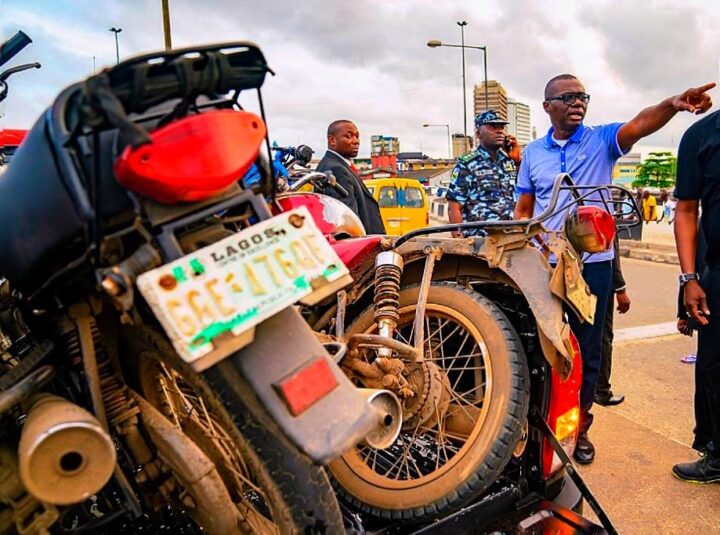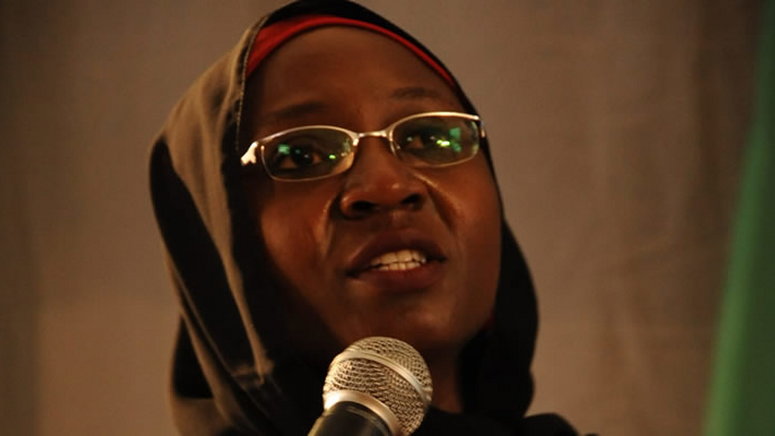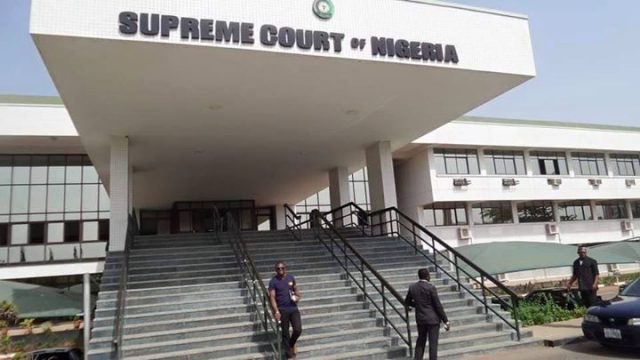BY ABAYOMI OGUNSANYA
In the wake of the ban on motorcycle taxi services in some parts of Lagos State, a protest was organized by some residents and civil society organizations to express the people’s frustration at what they perceived to be a policy targeting the poor in the city.
Pictures of the protest were circulated on social media, and in one particularly striking full-length portrait, a young woman is seen carrying above her head a placard with the inscription: ‘You Do Not Build a ‘Megacity’ by Hiding the Poor.’ What was arresting about that portrait was not just that troubling inscription but also the visage of the placard-carrying young woman: the deadpan expression on her face—together with that inscription—instantly called to mind another picture that had made the round a few years ago during the Occupy Nigeria Protest when thousands of people took to the streets to register their displeasure at the sudden removal of subsidy from petroleum which led to a hike in the price of fuel and a deplorable rise in the cost of living. In that portrait, which the Academic Staff Union of Universities adopted and used during its campaign against fuel subsidy removal and the underfunding of Nigerian universities, a young woman is seen carrying a placard on which is written the following: One Day the Poor Will Have Nothing to Eat But the Rich.
The sentiment that is conveyed by the message in both pictures is that the poor are a category of people with less social power and whom people with more social power or privileges, such as politicians and the rich, are constantly trying to undermine or obliterate from the social landscape. It is a message that should strike a chord with anyone who cares about the differential effects of social inequality on people and society at large. It is important to examine the import of these messages in light of other ancillary policies and actions taken by the Lagos government in recent times and how they affect sections of the state population. One of these policies is the ban on motorcycle taxi operations in some parts of the state. Quite predictably, that ban has attracted both condemnation and commendation, depending on what part of the opposite ends of the sociopolitical spectrum one embraces. For some, the ban is a step inthe right direction because it would bring a much needed order to the chaos that is much of urban life in Lagos. In an editorial opinion on Thursday 13, 2020, the Guardian Newspaper, for example, endorses theban and argues that it is ‘a necessary measure, even if it is inconvenient at the moment.’ While citing the reasons given by the Lagos States government for initiating the ban—which includes‘security’ and ‘safety’ of Lagosians—the newspaper aversthat ‘Lagos State government must go and study how modern megacities are planned, designed, run and how they efficiently function.’ Herein lies the crux of the matter—the fact that theban is less about safety and security and more, in my view, about developmentalism and a further attempt to aggravate the situation or condition of poor people.
Advertisement
Lagos aspires to the status of a megacity. Over the last few years, several measures have been taken to fulfil that aspiration and much gentrification drive has gone into transforming much of the urban landscape of the city. Each successive administration, especially since the return of democracy 20 years ago, has made reference to what is called the Lagos Master Plan—a document that is purported to exist and that specifies how the city should be laid out and run.The proposed Eko Atlantic City, which has been some years in the making, is part of that Master Plan. Other aspects of the plan are not popularly known, but each time a law is introduced or an action is taken which has a bearing on the development of the city, a reference is made to the Plan. What should be noted, as we contemplate the spectre of what might happen each time that Plan is invoked, is that the backwash of whatever action that is taken often leaves a sour taste in the mouth. Consider, to begin with,Otodo-Gbame. In March 2017, residents of that waterfront community in Lagos woke up to the sound of martial order, gunshots, and a stampede, and in an operation that lasted a number of days, the people were forcibly evicted and their homes destroyed by bulldozers as security services used tear gas and live bullets to clear the area. Earlier in November 2016, a similar operation had been carried out, and despite court orders restraining the Lagos Government from ejecting the people, the eviction took place without any prior notice. But Otodo-Gbame was not an isolated case; Amnesty International has been documenting forced evictions in Lagos State for over ten years and ‘these evictions are carried out without adequate prior consultation,adequate notice, and compensation or alternative accommodation. Before Otodo-Gbame, there was Maroko, and only last month, an other round of violence was unleashed on residents of Tarkwa Bay who were sent packing from their homes during a raid that left many traumatized and in desperate conditions.
These evictions and the recent ban on motorcycle taxis in Lagos are programmatic reforms linked to developmentalism in a way that is uncomplicated—uncomplicated if we are willing to pause and consider their disproportionate impact on the people in a place that is aspiring to the status of a megacity even though vast swathes of the population are low income earners living below the poverty line.Development is something that is desirable and necessary. It is a stepping stone to modernity. Arturo Escobar, who has studied this process in relation to Colombia, observes that ‘the development project was an invention of modernity. What was called modernization was precisely the process to bring about modernity—the ensemble of values, institutions, economic systems and social relations that originated in Europe in the seventeenth century, if not before—to what until recently was known as the ‘Third World.’ Development was the name given to the strategy of modernization.’ What Lagos—and other Nigerian cities with such an aspiration—desiresis development, which would lead to modernization, but the kind of development we are witnessing in Lagos—and Lagos is by no means a peculiar case though—is one that requires constant preying on the poor, one that requires sacrificing people with little means and power, one that is laborious and often ad-hoc. By suggesting that Lagos is by no means an isolated example, we are also admitting, like Escobar pointed out, that development project is never benign every where—it is often a kind of structural violence, one that manifests in forms of displacement, dislocation and even conquest. What is more, it often requires the poor as the sacrificial lamb. And this is the point that is often missed by those who support the ban on motorcycle taxis and the displacement of the poor from shanty settlements in the name of planning and development, while conveniently discountenancing the violence that is constitutive of such measures.
Inmost cases, when development projects are initiated, it is often at some human cost, and the category of humanity which mostly bears the brunt of that cost is the weak, the defenceless, people with little or no social power—indeed, the poor. Many of these projects are about displacement—uprooting people from their homes,removing them from their jobs or taking their jobs away from them etc. People’s livelihoods are displaced or imperilled, and where restructuring of physical settings is what is needed to create new settings like leisure spaces, homes are taken and run over, often with no alternatives and no compensation. What is significant here,we must stress, is not just that these projects are initiated for the greater good of all; even a cursory investigation would reveal that they are undertaken at the pleasure of politicians and plutocrats.Indeed, the ultimate beneficiary is often not the poor but the rich.Another version of this displacement is what we witness when big business and governments collude to wreak massive ecological destruction in the Amazon region after taking over Indigenous peoples’ lands. It is what we see where conflict minerals and fossil fuels become the basis for the exploitation of poor peoplewhose lands and lungs are destroyed through continuous carbon emission. It is also the kind of displacement and violence which industrial agriculture authorises in many places where big business have taken roots. In Brazil’s Amazon region, for instance, Amnesty International has warned of violent clashes ‘unless the government protects Indigenous peoples’ traditional lands from increasing illegal land seizures and logging by armed intruders’,and cobal textraction from the Democratic Republic of the Congo has been linkedto human rights abuses, corruption, environmental destruction and child labour. In these instances and many others, the poor are at the receiving end of structural violence which is often enacted through the collusion between politics and big business.
Advertisement
It bears repeating that development and modernity are, as Arturo Escobarre minds us, displacement-producing processes and often involve using the poor as dispensable elements in the social equation. Even when modernity has been attained through development strategies, the poor are hardly beneficiaries of development unless their socioeconomic conditions improve. This is why they have to be kept out of sight. In Nigeria, where corruption is rife and the yawning chasm of income differential between the rich and the poor is a matter of critical concern, the poor will remain trapped in poverty, unable to fully access the benefits of modernity. This will be the lot of many motorcycle taxi owners suddenly displaced in Lagos. It will be the lot of the poor people evicted from their homes in Tarkwa Bay and elsewhere.
Ogunsanya, an anthropologist, writes from Dublin, Ireland.
Views expressed by contributors are strictly personal and not of TheCable.
Add a comment






